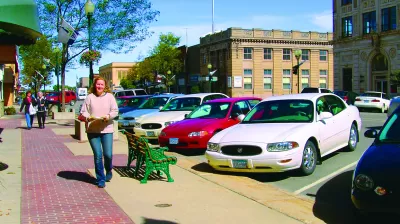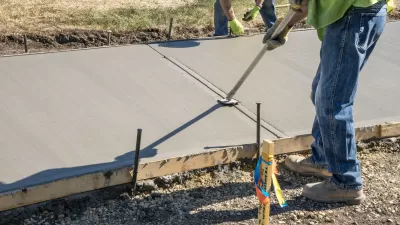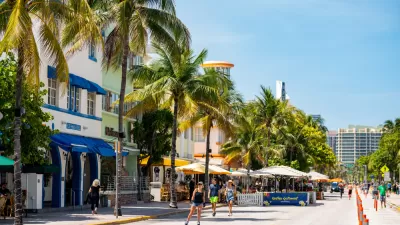With so much attention devoted to how technology will change roadways and vehicles, less speculation has attended to the ways technology will change walking.

"In the future, footpaths may remain physically similar, made of asphalt, concrete, or brick, but how they are used, and what we know about how they are used, will change – if change isn’t already afoot," according to an article by David Levinson.
Levinson, who usually blogs at Transportist, commences the analysis at the curb. As already playing out in U.S. cities, transportation network companies and self-driving cars will add to the number of pick-ups and drop-offs along curbs. "These uses are prescribed by regulations but there is a strong argument to be made that many of these regulations are poorly applied, or no longer appropriate given changing patterns of use and demand," writes Levinson, also citing the work of Coord in developing a cloud-based system to bring some structure to the chaos.
Levinson's analysis also gets into the proliferation of new forms of mobility like e-bikes, electric scooters, and delivery robots—all jockeying for position on sidewalks. All this analysis leads Levinson to the conclusion that the humble footpath is "functionally obsolete" in the face of these coming technological advancements.
FULL STORY: What will the footpath of the future look like?

Maui's Vacation Rental Debate Turns Ugly
Verbal attacks, misinformation campaigns and fistfights plague a high-stakes debate to convert thousands of vacation rentals into long-term housing.

Planetizen Federal Action Tracker
A weekly monitor of how Trump’s orders and actions are impacting planners and planning in America.

In Urban Planning, AI Prompting Could be the New Design Thinking
Creativity has long been key to great urban design. What if we see AI as our new creative partner?

King County Supportive Housing Program Offers Hope for Unhoused Residents
The county is taking a ‘Housing First’ approach that prioritizes getting people into housing, then offering wraparound supportive services.

Researchers Use AI to Get Clearer Picture of US Housing
Analysts are using artificial intelligence to supercharge their research by allowing them to comb through data faster. Though these AI tools can be error prone, they save time and housing researchers are optimistic about the future.

Making Shared Micromobility More Inclusive
Cities and shared mobility system operators can do more to include people with disabilities in planning and operations, per a new report.
Urban Design for Planners 1: Software Tools
This six-course series explores essential urban design concepts using open source software and equips planners with the tools they need to participate fully in the urban design process.
Planning for Universal Design
Learn the tools for implementing Universal Design in planning regulations.
planning NEXT
Appalachian Highlands Housing Partners
Mpact (founded as Rail~Volution)
City of Camden Redevelopment Agency
City of Astoria
City of Portland
City of Laramie





























